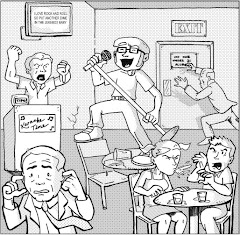Strike! #1, August 1987, Eclipse Comics
writer: Charles Dixon
penciller: Tom Lyle
inker: Romeo Tanghal
letterer: Kurt Hathaway
colorist: Ron Courtney
editor: Cat Yronwode
On Martin Luther King Day, I began a series of reviews to commemorate the approach of Black History Month this February. As I’ve introspectively explored my reasons for tackling this thematic project-within-a-project, I’ve thought about the essence of Dr. King’s ministry, and specifically, how it relates to the pop culture that spawns these comics I so adore. The very concept of “Black History Month” implies a distinct and separate desire to be understood, a concerted cry that beseeches society to comprehend what black culture has experienced and endured. I dare to suggest that the true mission of Black History Month advocates should be eradication – should be the day when “black history” is so naturally incorporated into our general consciousness that we as a global communally accept each others’ respective plights, and further relate to them in the context of our own struggles, neither of which overshadow the other. Remember, Dr. King longed not for color-centrism, but color blindness. In pop culture, while some cultures are more adept at specific forms of expressions than others, to segregate each strand back to its origins is to deny everyone the chance to enjoy the richness of the tapestry. Musicians are musicians no matter what kind of music they make, and superheroes are superheroes no matter what part of the city they live in.
I’m looking at you, VH1’s The White Rapper Show.
Actually, I’m looking at Strike!, a comic book with bigoted undertones undoubtedly designed to inspire its readers to think about such things. Written by “Charles Dixon,” the famous Batman and Robin scribe, I presume, Strike! is, on the surface, an unadulterated superhero comic book about a child that discovers the lost diary and power harness of a former World War II meta-soldier. In fact, a majority of this introductory issue establishes the history of Sgt. Strike’s coveted harness, which utilizes the power of a mysterious meteorite, and how it transformed military man Russell Carlyle into the Golden Age icon that fought for, but eventually lost faith in, his country. Yes, Sgt. Strike is another Captain America rip-off, akin to the distained-but-not-forgotten Captain Paragon. However, despite the issue’s adventurous wartime bravado, Dixon’s first few pages set the series’ true tone.
Dennis is a black community college student trying to escape the ghetto through education, trapped between the ruthlessness of his peers and the pride of his father to really get anywhere. The first panel of the second page delivers an unexpected dose of prejudicial harshness; while Dennis and his friend Bobby strolls past a cluster of hoodlums, one of them shouts, “Hey, it’s my man Dennis an’ his little faggot Ko-rean buddy.” That infamous “f-word,” which has made the recent rounds thanks to Grey’s Anatomy actor Isaiah Washington’s slip of the tongue earlier this month, appears at least two more times in the next few panels. First of all, I wonder if I would’ve been as affected by the slur had the term not been in the news so much lately. Secondly, I wonder if Dixon strategically planted this hot-button word in his story to set the stage for future issues’ subplots. After all, when Dennis dons the Strike power harness at the end of this issue, we’re led to believe that he plans to adopt the hero’s identity for a new generation. Will America accept a black face under the mask of a former, beloved, white superhero? Fortunately, Dixon doesn’t pigeonhole prejudice to any given stereotype, but assures us that everyone is a perpetrator as much as he is a victim. In a stroke echoing reality, it’s a black man that uses the “f-word.” If anyone is to escape the circumstances of their surroundings, Dixon implies that he must first escape the confines of his worldview.
So, although Strike! #1 primarily stars an old white super-soldier, the future of his black successor legitimizes this issue’s place in my series of Black History Month reviews. In fact, while my previous two installments focused more on the issues’ iconic characters, Strike! dares to tackle the struggle of acceptance. Thinking upon the concept, and of the plight Dixon creates with Dennis, I wonder if acceptance is the right word. The way Dennis and his friend is attacked by their peers, the way he longs to flee his native community, conjures speculation that even many young black people do not accept their culture as it is presented to them. If it weren’t so distinctive to their very identity, would this challenge seem so dire? If black youth understood that other kids of different cultures felt the way desperation to escape their circumstances, would they seek more help from outside their sphere? Perhaps acceptance isn’t the word, as much as integration.
Monday, January 29, 2007
Subscribe to:
Post Comments (Atom)



No comments:
Post a Comment